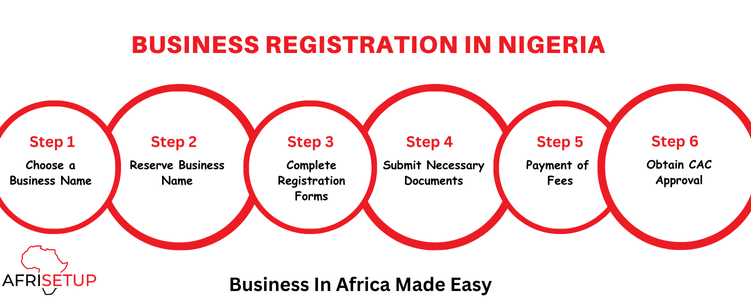- By afrisetupconsultants
- Uncategorized
- 0 Comment

Business Registration in Nigeria- Nigeria offers one of the largest and most dynamic markets in Africa, presenting ample opportunities for both local and foreign businesses. As an aspiring business owner, registering a business in Nigeria is not only a legal requirement but also provides various advantages, such as access to government contracts, eligibility for tax incentives, and enhanced credibility among customers.
Before we dive in, it’s important to note that for over a decade, we’ve been helping business owners like you register a business in Nigeria, all from the comfort of their home country. As a result, we’ve earned a reputation as the top choice for investors seeking a smooth and efficient registration process in Nigeria. Call us today!
This guide will walk you through the essentials of business registration in Nigeria, from selecting the right business structure to understanding compliance requirements.
Contact us today for expert advice
Corporate Affairs Commission | CAC
The Corporate Affairs Commission (CAC) is the primary regulatory authority in Nigeria responsible for the registration and regulation of businesses. Established in 1990, CAC plays a vital role in promoting corporate governance and protecting the interests of investors and the public.
Key Functions of the Corporate Affairs Commission:
The Corporate Affairs Commission of Nigeria performs several important roles, including:
ü Regulating Companies: CAC oversees the formation, incorporation, management, and dissolution of companies within Nigeria.
ü Business Registration: CAC is responsible for registering business names and incorporated trustees.
ü Company Investigations: CAC has the authority to investigate a company’s operations when it is deemed necessary for the protection of public or shareholder interests.
ü Maintaining Company Records: CAC creates and maintains company registries and offices across all states in Nigeria.
List of registered companies in Nigeria with CAC | Types of Business Registration in Nigeria | What are the types of business registration in Nigeria? | What are the different types of business registration in Nigeria?
The CAC allows for different types of business registrations, each tailored to various business needs:
- Sole Proprietorship: Ideal for individuals, this registration type is straightforward but does not offer limited liability.
- Partnership: Two or more individuals can register as partners, sharing both responsibilities and profits.
- Limited Liability Company (LLC): One of the most popular structures, LLCs offer liability protection, separating personal assets from business debts.
- Public Limited Company (PLC): Suitable for larger businesses, especially those looking to raise capital by offering shares to the public.
- Incorporated Trustees: This structure is primarily for nonprofit organizations, foundations, or religious groups, where the aim is not profit but rather community service.
Business name registration in Nigeria | Online business registration in Nigeria | how to register a business in Nigeria | How do I register a business in Nigeria? | How can I register my small business in Nigeria?
Ready to register a business in Nigeria? At Afrisetup, we follow the steps outlined below to ensure a smooth registration process:
1) Choose a Business Name: Check the availability of your preferred name on the CAC portal.
2) Reserve Business Name: If available, reserve the name through the CAC for exclusivity.
3) Complete Registration Forms: Fill in required forms detailing business information and ownership structure.
4) Submit Necessary Documents: Upload documents such as ID proof, address verification, and incorporation forms.
5) Payment of Fees: Pay applicable registration fees online.
6) Obtain CAC Approval: Once reviewed, CAC issues a certificate of incorporation, completing the process.
The process above may seem long and tedious, right? That’s why we’re here to help. We’ve made hassle-free. Contact us today for expert advice
How much is business name registration in Nigeria | Cost of registering a Business name in Nigeria| Cost of registering a business name in Nigeria | How much is business registration in Nigeria | How much can I use to start a business in Nigeria?
The costs of business registration in Nigeria can vary significantly. Typical expenses include:
- Registration Fees: Fees differ based on business structure, with LLCs generally incurring higher costs.
- Hidden Costs: Additional expenses such as document notarization, TIN acquisition, and bank account setup.
N/B- Budget for all costs upfront and explore ways to minimize expenses, such as completing documentation online. Call us today to get an accurate quote, so you can be fully prepared to register a business in Nigeria.
Business registration in Nigeria requirements | What are the legal requirements for starting a business in Nigeria?
To register a business in Nigeria, you’ll need to meet certain requirements, which may vary based on the business structure. Key requirements include:
v Choose a business name: Pick a distinctive name and check its availability with the Corporate Affairs Commission (CAC).
v Prepare required documents: Collect all necessary documents for the incorporation process.
v Fill out forms: Complete the pre-registration form along with the statement of share capital.
v Pay applicable fees: Pay the stamp duty and filing fees.
v Upload required documents: Upload all relevant documents as instructed.
v Submit your application: Submit the application online through the CAC portal.
v Receive the certificate: Upon approval, the CAC will provide electronic incorporation certificates and other required documents.
How to check business registration in Nigeria
To verify a business’s registration, follow these simple steps:
1. Go to the CAC’s website.
2. Scroll down and select “Public Search.”
3. Enter the business’s RC Number (if available) or its full name in the search box, then click “Search.”
4. If the company is registered, the search results will show its full name, RC number, and office address.
Why Register a business in Nigeria |What are the benefits of business registration in Nigeria? | Importance of Business Registration in Nigeria
Once you Register A Business In Nigeria, you enjoy alot of benefits like enhanced credibility, legal security, and growth opportunities. Here’s an overview of the key advantages:
1. Legal Recognition and Protection
Business registration provides official recognition, allowing the business to operate legally under the protection of Nigerian law. This reduces the risk of name conflicts or brand infringement and protects the business against unauthorized use of its intellectual property.
2. Access to Loans and Government Incentives
Registered businesses have access to government-backed loans, grants, and other financial programs designed to support businesses in Nigeria. These opportunities are often not available to unregistered businesses, providing a distinct advantage for registered entities.
3. Building Trust and Credibility
Registration boosts a company’s credibility, making it more appealing to clients, suppliers, and potential investors. A registered business is seen as more reliable and legitimate, which can improve client and partner relationships and open doors to new business opportunities.
4. Tax Identification Number (TIN) and Compliance
Registering a business allows the entity to obtain a Tax Identification Number (TIN), which is essential for tax compliance and legitimacy in Nigeria. This also enables the business to claim tax deductions and other allowances available to registered businesses.
5. Ability to Open Corporate Bank Accounts
With a registered business, owners can open a corporate bank account in the company’s name. This not only separates personal and business finances but also adds professionalism, which is beneficial when dealing with clients and vendors.
6. Participation in Government Contracts and Tenders
Many government contracts, tenders, and projects are exclusively available to registered businesses. Having a registered entity increases eligibility for these contracts, providing substantial growth opportunities, especially for small and medium-sized enterprises (SMEs).
7. Enhanced Business Continuity and Succession
A registered business entity can outlast its founders. By creating a legal structure, businesses gain continuity beyond the original owners, which supports long-term planning, succession, and business resilience.
8. Access to International Markets and Export Opportunities
Registration opens the door to exporting goods and services, participating in international trade, and meeting foreign market requirements. This is essential for businesses aiming to expand beyond Nigerian borders and benefit from global trade networks.
9. Improved Brand Reputation and Competitive Advantage
Registration enhances a brand’s image, giving it an edge over unregistered competitors. This is particularly important in Nigeria’s growing marketplace, where credibility and brand integrity play a key role in consumer decisions.
10. Support for Growth and Expansion
Registered businesses often find it easier to attract investors and partners who look for legitimacy and a structured legal entity before committing to partnerships. Additionally, the ability to issue shares (for companies limited by shares) can provide capital for expansion.
FAQS
Can a foreigner register a business in Nigeria?
Foreigners are allowed to register a business in Nigeria. The country’s open-market economy and the Companies and Allied Matters Act of 2020 (CAMA) permit foreign nationals to establish companies without any limitations.
How many days does it take to register a business in Nigeria? | How long does it take to register a business in Nigeria?
The duration to register a business in Nigeria varies based on the business type and the accuracy of the submitted documents. Typically, the process takes around 1 to 2 weeks.
What documents are needed to register a business in Nigeria?
Required documents vary by business structure but typically include identification for all directors and shareholders, a memorandum and articles of association, a statement of share capital, and proof of address. Additional documents may be required depending on the nature of the business.
Is it possible to register a business online in Nigeria?
Yes, the Corporate Affairs Commission (CAC) offers an online registration portal where applicants can reserve business names, upload documents, and pay fees electronically. This online platform has simplified the registration process and made it more accessible.
What are the tax obligations after registering a business?
Registered businesses must obtain a Tax Identification Number (TIN) and, in some cases, register for Value Added Tax (VAT). Businesses are required to file tax returns annually and meet other Federal Inland Revenue Service (FIRS) obligations depending on their structure and revenue.
Do I need a physical office address to register my business?
Yes, a physical office address is required to register a business in Nigeria. This address will be listed as the official location of the business and is essential for record-keeping and legal notifications.
Conclusion
Registering a business in Nigeria establishes credibility and paves the way for growth and success. By following the outlined steps, understanding regulatory requirements, and preparing necessary documents, entrepreneurs can ensure a smooth registration process. With registration comes access to a world of opportunities, from government incentives to legal protections, helping businesses thrive in Nigeria’s vibrant economy. Register your business in Nigeria with us!

